This is what it is like to be a Yorkshire Wildlife Park carnivore ranger
Even for a place that has become known as the polar bear capital of the UK, bringing in a new 1,102lb resident represents a major undertaking.
The arrival of Rasputin to Yorkshire Wildlife Park near Doncaster five weeks ago to become the fifth member of England’s only polar bear enclosure involved a 1,000-mile journey from his previous home in the south of France that had been months in the planning and overseen by a team of vets and transport specialists.
Advertisement
Hide AdAdvertisement
Hide AdWhen the 12-year-old bear finally arrived in South Yorkshire, a JCB was required to lift his crate from the back of his transport lorry before being painstakingly placed up against the door of his new home before it was opened to let him out.
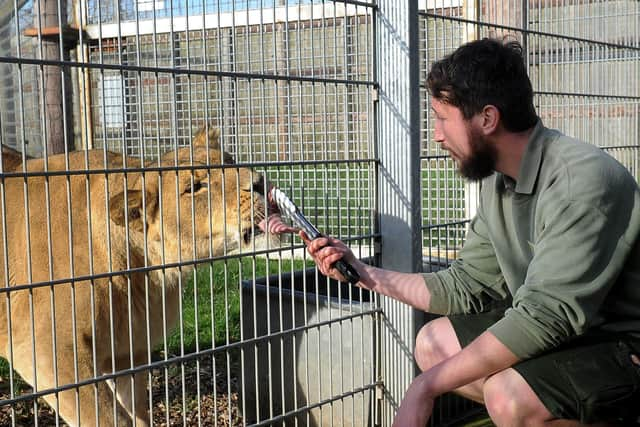

Rasputin, who had recently become a father to three cubs at his home in Antibes but needed to be separated from them for their safety, is currently part-way through four months of quarantine before he will be allowed to move into the 10-acre enclosure of reserves and lakes at the park known as Project Polar and already home to Victor, Pixel, Nissan and Nobby.
Among those responsible for helping Rasputin settle into his new home is Adam Spencer, part of the carnivore team of animal rangers at the park. In addition to key practical tasks such as feeding and cleaning, Spencer says it is important to develop an understanding with the animals in his care.
“It is about building that relationship with them. Hopefully that will be easier with Rasputin because he is in quarantine so you can work on a one-to-one basis. He is very playful.
Advertisement
Hide AdAdvertisement
Hide Ad“The other four bears are all very different and it will be interesting to see how he fits in when he comes out of quarantine.”
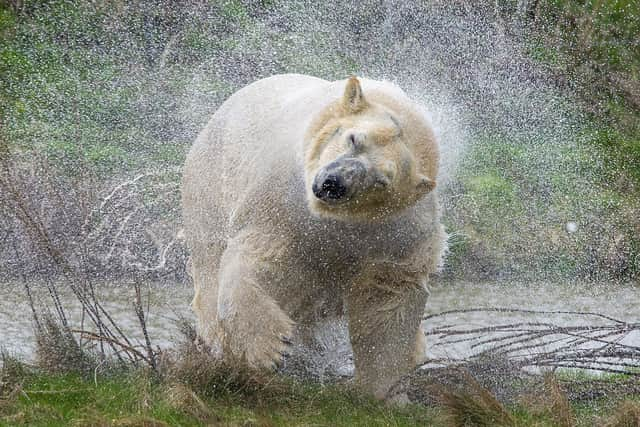

He says in his job it is common to develop a close bond with the animals you are looking after.
“You spend so many hours here with these animals it makes sense that it is going to happen. It happens with people’s pets – their dogs and cats – and this is no different.”
Being part of the carnivore team means working with other animals such as lions and tigers that are classified as Category One because of the danger they would pose should they escape.
Advertisement
Hide AdAdvertisement
Hide AdIn November, social-media rumours spread in Doncaster that a lion had escaped from the park, resulting in the park issuing a statement confirming the claim was completely false and adding that no lions had ever escaped, with advanced procedures and precautions in place to prevent such an incident.
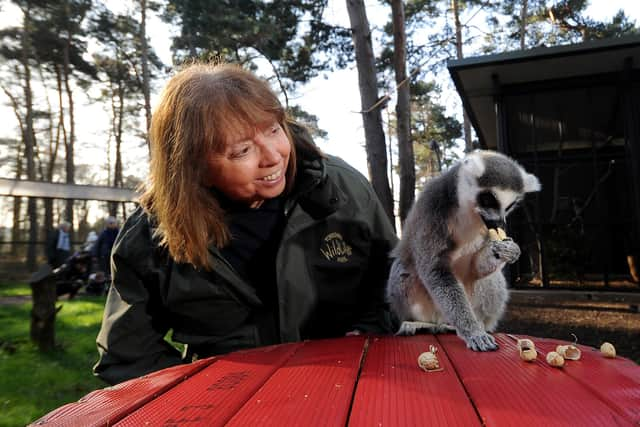

“You get good at checking locks,” says 29-year-old Spencer, who has worked at the park for four years. “When you are working with Category One animals you have to take a lot of precautions.
“There is a lot of health and safety stuff and a lot of training. Sometimes you do go by yourself and generally speaking I’m happier with that in that I have checked the locks myself so I’m aware of exactly what’s going on.”
Spencer, who studied animal management at Askham Bryan College in York and volunteered in South Africa and Croatia before coming to Yorkshire Wildlife Park, says working with such animals had always been his ambition.
Advertisement
Hide AdAdvertisement
Hide Ad“It has just always been an interest of mine. As a child, it was dinosaurs I loved but I obviously couldn’t work with them.
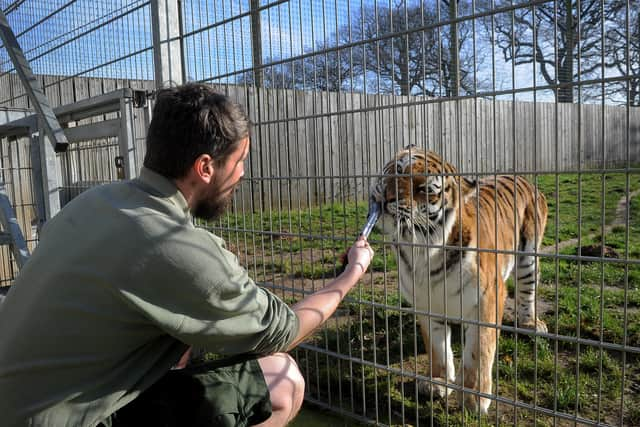

“It is definitely a lifestyle choice – you have got to be prepared to get your hands dirty and work long hours. When it is a positive day, you can’t beat it.
“My family expected it. My mum was quite happy when I moved out because I took my animals with me! I had mainly reptiles, including a snake. Not everybody is fortunate enough to do what they love. I am.”
Spencer says the hardest part of the job was when animals they care for pass away.
Advertisement
Hide AdAdvertisement
Hide Ad“It is part and parcel of the industry that at some point an animal you care for is going to die. If it is coming to the end or in pain then obviously you accept it but it is still very sad. It helps if you know that you have provided the best quality care you can.”
But he says the best thing is being part of transforming the lives of animals, many of whom come to the park after having been badly mistreated elsewhere.
Spencer says this was particularly the case with a group of four endangered brown bears who had previously been kept in bleak, cramped cages in Japan before being moved to Yorkshire.
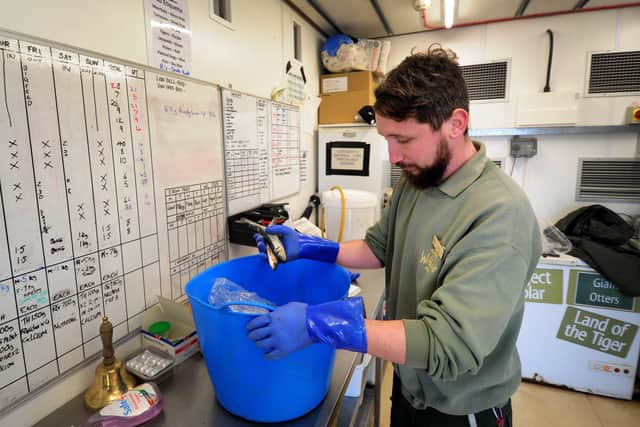

“When we put the two boys together, after they had never really been together, to see them doing things like play-fighting and going into the water together was just amazing.”
Advertisement
Hide AdAdvertisement
Hide AdYorkshire Wildlife Park has built its international reputation as a haven for endangered animals in a remarkably short time since opening 11 years ago.
The arrival of Rasputin came after it was recommended as the best home for him by the European Endangered Species Programme.
Cheryl Williams was one of the five founding directors of the park and says she struggles to believe how it has grown.
She was marketing manager at Woburn Safari Park in 2008 when she and her husband Neville and colleague John Minion heard that a riding school and farm attraction near Doncaster was up for sale. When they came to visit, the idea of taking over the business evolved into a plan to create something very different.
Advertisement
Hide AdAdvertisement
Hide AdShe says: “We knew it had great potential. You have different environments here with woodland, wetland and grassland. We knew we could create what would feel like a walk-through safari park but we had no idea it would grow to the scale it is today.”
Williams says the park was put on the map as a result of a £150,000 fundraising campaign with the now-defunct News of the World to rescue 13 lions from a dilapidated Romanian zoo.
The lions were flown to South Yorkshire in a converted Boeing 737 in 2010 and Williams says their arrival remains one of her most cherished memories from her time at the park
“When the lions arrived and were flown into Doncaster Sheffield Airport that was amazing. There were 13 lions being unloaded on crates along the runways. There was so much media to see them arrive and I just thought, ‘Crikey, that is lot of lions’.”
Advertisement
Hide AdAdvertisement
Hide AdWilliams says as well as being a good family day out, those at the park believe greatly in the importance of educating their visitors.
“We want people to love the animals and care about their welfare as much as we do. By people learning and listening to the great stories the rangers tell gets them engaged on a greater scale.”
She says that witnessing the awe on people’s faces when they saw things like a polar bear for the first time never lost its appeal.
“People realise how amazing they are but seeing them in the flesh is a completely different experience,” she says.
Expansion work under way
Advertisement
Hide AdAdvertisement
Hide AdYorkshire Wildlife Park has begun a £50m expansion programme that is set to create hundreds of new jobs.
Cheryl Williams says: “We have got big plans for the next three years, having acquired another 150 acres.”
New species, including endangered animals, will be introduced to the park, with South American Pacific, South American Panatal, Asian Forest and African Valley zones introduced as part of the changes.
The park is already home to almost 400 animals from about 70 species and attracts more than three-quarters of a million visitors per year.
A new visitor hub and hotel are also among plans for the site’s expansion.
Comment Guidelines
National World encourages reader discussion on our stories. User feedback, insights and back-and-forth exchanges add a rich layer of context to reporting. Please review our Community Guidelines before commenting.